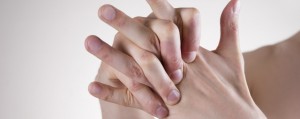 HYANNIS – Orthopedic surgeon Brian Najarian, MD cracks his knuckles about three times a day.
HYANNIS – Orthopedic surgeon Brian Najarian, MD cracks his knuckles about three times a day.
“It’s not a habit or a tic,” he said. “It’s more something for relief of pressure; my fingers feel more flexible.”
Dr. Najarian, who specializes in hand surgery at Cape Cod Hospital, and has offices in both Hyannis and Sandwich, said he sometimes cracks his knuckles for these perceived benefits the day before he operates. He said he would not crack his knuckles if he thought doing so would harm his hands – after all, they’re his livelihood.
“I do have patients who’ll see me crack my knuckles and they’ll say, ‘Hey, you shouldn’t be doing that!’” he said. “And I’ll be thinking, ‘Oh, really?’”
By way of personal disclosure, Dr. Najarian said, “I’m 39. I’m not in the age group where you see arthritis in your hands anyway.”
Several studies have looked at whether knuckle cracking can lead to arthritis. They’ve concluded that it doesn’t, though some suggest it might weaken grip strength or damage soft tissue. Dr. Najarian said he hasn’t seen any solid evidence to convince him of those claims. However, repeated physical stress can contribute to developing arthritis in hand joints, he said.
“How you use your hands can be a risk factor,” Dr. Najarian said. “People who do a lot of gripping: holding a pencil, dental hygienists. We’re talking about stress all the time for a long period of time.”
Other risk factors include age, family history, trauma to a joint, bacterial infection and inflammatory conditions, such as psoriasis or gout, he said.
What causes that sound when a knuckle is cracked?
Until recently, health experts thought the noise was due to gas bubbles in the joint popping. A radiology professor at the University of California, Davis, lent support to the theory that the sound originates from the rapid formation of these bubbles, not their destruction. Using ultrasound, researchers led by Robert D. Boutin, MD, made 400 videos of the joint at the base of fingers being cracked. Unexpectedly they found that the noise was accompanied by a flash of light inside the joint.
“There have been several theories over the years and a fair amount of controversy about what’s happening in the joint when it cracks,” Dr. Boutin said, according to a recent press release from the Radiological Society of North America. “We’re confident that the cracking sound and bright flash on ultrasound are related to the dynamic changes in pressure associated with a gas bubble in the joint.”
Earlier research indicated when someone pulls on a joint to crack it, this creates a cavity – an area of low pressure – within the joint capsule. Gases dissolved in the synovial fluid inside the joint capsule then rapidly come out of solution to form a bubble.
An abstract published in April by the Public Library of Science states that MRI evidence shows that the knuckle-cracking sound comes from formation of gas bubbles, likely due to a process called “tribonucleation,” in which “opposing surfaces resist separation until a critical point where they then separate rapidly creating sustained gas cavities.” The research team was led by Gregory Kawchuk of the Department of Physical Therapy at the University of Alberta, in Edmonton, Canada.
According to an entry in How Stuff Works , these bubbles can last about 20 minutes, during which time the knuckle cannot be cracked again.
While people may find knuckle cracking irritating, there’s no scientific reason that it harms finger joints, Dr. Najarian said. “It’s just an old wives tale.”
But, all the same, he recommends moderation. Knuckle-crackers should not go overboard, or “obviously, if they’re doing something excessively,” there may be some risk.

























Speak Your Mind